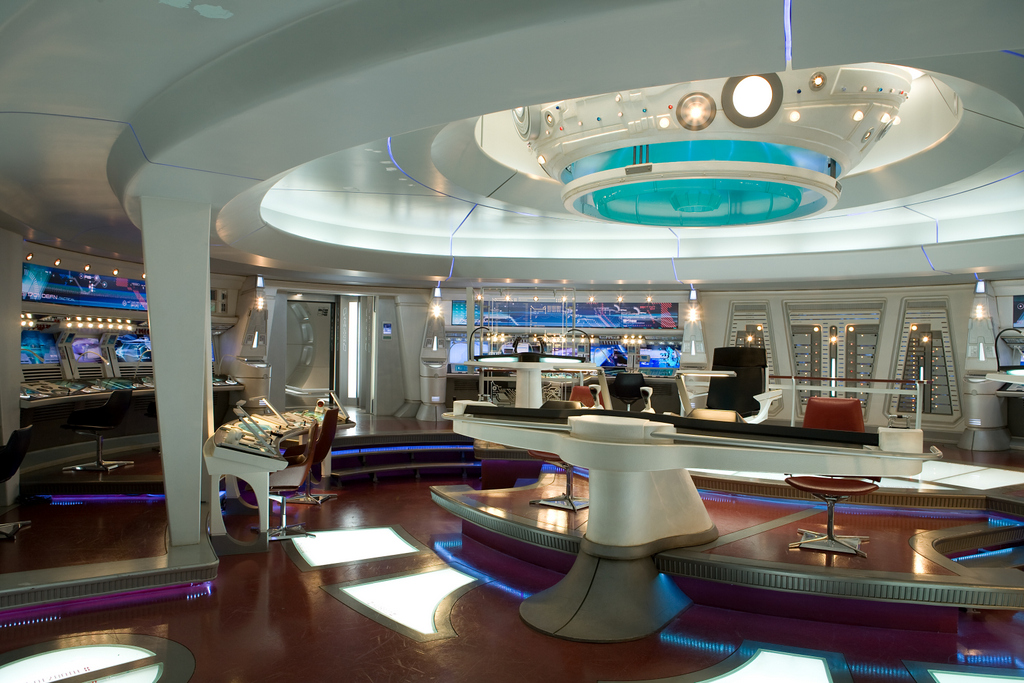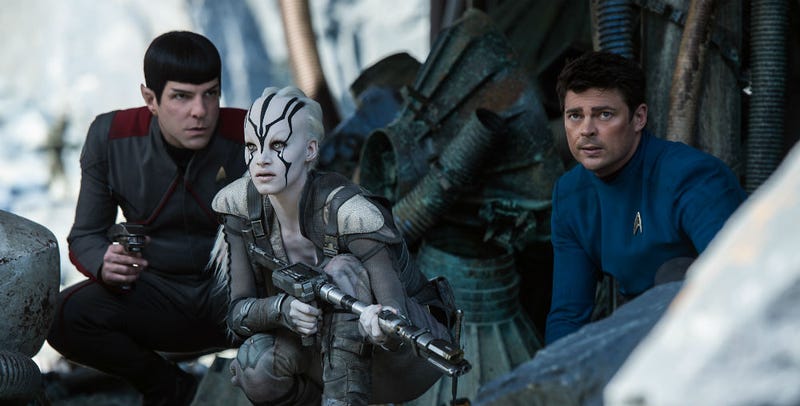Being a Star Trek fan has always been a double edged bat’leth. On the one hand it has enjoyed some of the
finest science fiction writing to date with both The Wrath of Kahn and First
Contact topping the majority of the competition. On the other however, is The Motion
Picture. Enough said. But then came the event. The trauma.
The reboot. Which is in no way a
commentary on the movie’s quality, but the fear engendered by the very notion
of a new Kirk, a new Spock and a new Enterprise. For while undoubtedly mainstream, Star Trek
has always been off centre in terms of its popularity; the very term “Trekkie”
becoming part of everyday lexicon to denote a rather nerdy individual. A king among all geeky men.
 |
| Brought to you by Apple IN SPACE! |
The new Trek was specifically designed to do
away with all that. It was meant to be
sleek, cool and oozing sex appeal. Even
Spock became the focus of some serious man crushes. It also did away with the techno-babble that
so flummoxed and confused the regular going public. Something Star Trek had always been famous
for; the inversions of field polarities and harmonic resonances being part of
every true Trekkie's vocabulary. Instead, we got “lightning storms in space”, thanks J.J.
As you may be able to tell, I was not over enamoured with this dumbing
down but I enjoyed the first two movies well enough. They were fun if uninspired and wiled away a
few hours in a thinned out universe I still loved. Originality however, was sorely lacking.
Much as
with the new Star Wars a fear of doing too much outside the established norm
bred complacency and not a little laziness.
The first was centred entirely on resetting the continuity and making it
clear Trek was now cool. The second
clung so tightly to The Wrath of Kahn’s popularity that it left little in the
way of effort and committed multiple plot convenience sins. Super blood, interplanetary beaming
technology and why, oh why the Klingons let the slaughter of dozens of soldiers
go without even a shrug, to name a few?
But, as I said, they’re fun movies nit picking aside. With Beyond therefore, I was expecting more
of the same. So colour me speechless
when all did not go according to presumption.
 |
| Lines around the eyes. |
From the very beginning there is a feeling that this is a Star Trek
film. Perhaps due to the Enterprise being three years into their five-year mission, or simply that the cast has
grown into their roles. Iconic and
daunting as they surely are. Some are
still more fleshed out than others, Chekhov and Uhura still lagging behind in
the developmental races, but from Chris Pine we get a better rounded character. A character who identifies as James Tiberius
Kirk. The rigours of command have
finally started to take a toll, making both he and Spock question their places
with Starfleet. It’s a definite nod to
the original films, with Kirk’s possible admiralship being dangled as a
diverging path. The road taken in
another life and perhaps, even after all that has happened, again here. It adds definition to a captain who’s seen
two movies go by serving the Federation all on a dare, with nary a thought for
whether he really belongs.
 |
| Krall, there'll be no cancelling the apocalypse. |
 |
| Relatable and awesome. |
We also see the introduction of Jaylah,
ably played by Sofia Boutella of Kingsman fame.
Remember those blades? The disabled
had never been so deadly. A refreshingly
able but flawed character, both Justin Lin and the screenwriters involved
deserve a pat on the back. Vulnerable
but competent, brave but unsure, she makes for a fine addition to the crew and
it’ll be fun to see whether she returns in future installments. Hopefully, alongside an absent Carol Marcus who
for some reason they were unable to work into Beyond. One suspects the controversy the internet
created over *that* scene in Into Darkness may have played a part, but one
never knows. In any case she contributed
mightily to my enjoyment of the film and aided it in pipping Star Wars: The
Force Awakens to the post for my favourite science fiction film of the recent
past. Originality is a boon, not a sin
and it’s a lesson Star Trek seems to have learned from its previous outings.
 |
| Live long and... well you know the rest. |


No comments:
Post a Comment